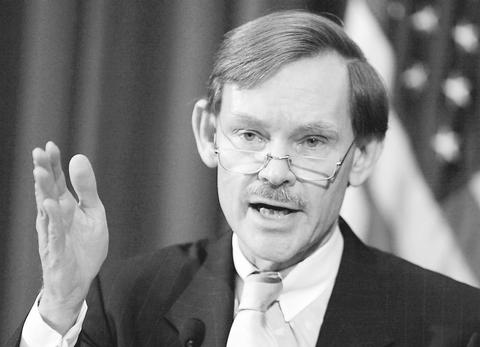The top trade official for the US and his counterpart from the EU swapped jabs over steel and farm subsidies, issues that threaten a trans-Atlantic trade war.
US Trade Representative Robert Zoellick on Tuesday defended President George W. Bush's imposition of tariffs up to 30 percent on foreign steel imports to protect American steelmakers and his signing into law of a huge increase in subsidies to American farmers.

PHOTO: REUTERS
Citing criticism from Europe that the moves betrayed the administration's free-trade principals, Zoellick said that it has become fashionable for European leaders to contend that the US was veering toward protectionism.
"Sanctimoniousness is a posture. It is not a policy," Zoellick told a global economic forum at the US Chamber of Commerce.
In reply, European Trade Commissioner Pascal Lamy, who spoke to the conference by satellite hookup, said the only conclusion one could draw was that the steel sanctions and the big increase in farm subsidies were supported by the administration with an eye toward winning votes for Republicans in key congressional races this November.
"These disputes ... do not stem from the rationality of economics," Lamy said. "They stem from the irrationality of politics."
Lamy said the administration has defended the moves as necessary to win congressional support for the authority Bush needs to negotiate trade agreements.
Legislation to that effect is pending before the Senate this week.
But Lamy said the tariffs on imported steel and the big boost in farm subsidies were too high a price to pay for a Bush victory on "trade promotion authority," which would allow Bush to negotiate trade deals that cannot be amended by Congress.
"We Europeans are not prepared to pay for TPA with steel protection," Lamy said. "If TPA has a price, it must not be too high a price."
Lamy said that the big increase in US government subsidies to farmers in the new farm bill would make it harder for Europe to continue to reduce its own high farm subsidies.
EU officials have charged that the farm bill that Bush signed into law last week violates WTO rules. Zoellick said the new subsidies would keep the US within the WTO cap of US$19.1 billion annually in US farm subsidies, and he noted that the 15-nation EU has a far higher WTO cap of US$60 billion in annual subsidies.
"In some ways, it is a buildup [in US subsidies] to build down," Zoellick said.
American negotiators, he said, would have more leverage to win concessions on the issue from Europe in the new global round of trade talks.
On the steel issue, Zoellick said the US believed it had acted within WTO rules when it imposed the tariffs of up to 30 percent on certain categories of steel imports to provide three years of protection to the domestic industry.
Europe has contended otherwise and threatens to impose its own sanctions of US$345 million on American exports to Europe, starting next month, unless Bush compensates Europe for the higher steel tariffs.

The CIA has a message for Chinese government officials worried about their place in Chinese President Xi Jinping’s (習近平) government: Come work with us. The agency released two Mandarin-language videos on social media on Thursday inviting disgruntled officials to contact the CIA. The recruitment videos posted on YouTube and X racked up more than 5 million views combined in their first day. The outreach comes as CIA Director John Ratcliffe has vowed to boost the agency’s use of intelligence from human sources and its focus on China, which has recently targeted US officials with its own espionage operations. The videos are “aimed at

STEADFAST FRIEND: The bills encourage increased Taiwan-US engagement and address China’s distortion of UN Resolution 2758 to isolate Taiwan internationally The Presidential Office yesterday thanked the US House of Representatives for unanimously passing two Taiwan-related bills highlighting its solid support for Taiwan’s democracy and global participation, and for deepening bilateral relations. One of the bills, the Taiwan Assurance Implementation Act, requires the US Department of State to periodically review its guidelines for engagement with Taiwan, and report to the US Congress on the guidelines and plans to lift self-imposed limitations on US-Taiwan engagement. The other bill is the Taiwan International Solidarity Act, which clarifies that UN Resolution 2758 does not address the issue of the representation of Taiwan or its people in

US Indo-Pacific Commander Admiral Samuel Paparo on Friday expressed concern over the rate at which China is diversifying its military exercises, the Financial Times (FT) reported on Saturday. “The rates of change on the depth and breadth of their exercises is the one non-linear effect that I’ve seen in the last year that wakes me up at night or keeps me up at night,” Paparo was quoted by FT as saying while attending the annual Sedona Forum at the McCain Institute in Arizona. Paparo also expressed concern over the speed with which China was expanding its military. While the US

SHIFT: Taiwan’s better-than-expected first-quarter GDP and signs of weakness in the US have driven global capital back to emerging markets, the central bank head said The central bank yesterday blamed market speculation for the steep rise in the local currency, and urged exporters and financial institutions to stay calm and stop panic sell-offs to avoid hurting their own profitability. The nation’s top monetary policymaker said that it would step in, if necessary, to maintain order and stability in the foreign exchange market. The remarks came as the NT dollar yesterday closed up NT$0.919 to NT$30.145 against the US dollar in Taipei trading, after rising as high as NT$29.59 in intraday trading. The local currency has surged 5.85 percent against the greenback over the past two sessions, central